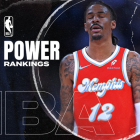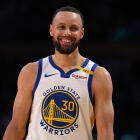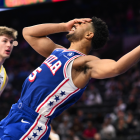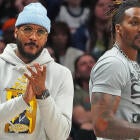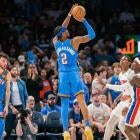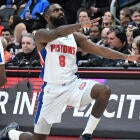Russell Westbrook is shattering the limits for production from a single player. You've no doubt heard the words "Russell Westbrook" and "triple-double" used together so often that triple-double may become the first phrase you think of when Westbrook is mentioned, just ahead of "wore a [blank]" and "shuts down a reporter."
The Thunder are 14-9, and Westbrook is currently second in scoring, second in assists per game and ninth in rebounds per game. He's averaging 30.9-10.8-11.3 and has logged seven straight triple-doubles, the second-longest streak in league history.
So yeah, he's doing some stuff. But there's a lot of debate about how to put this performance in context, and how good he really is, even with these insane numbers. So let's talk about it.
What he's doing is insane
He's on pace to be only the second player after Oscar Robertson to average a triple-double and within range for the most triple-doubles in a season, held by Robertson in 1961-62 with 41. Westbrook has 12 though 23 games through Friday night's loss to Houston while averaging 30-plus ppg. Michael Jordan had 10 30-point triple-doubles in 1988-89. Westbrook is already only one behind him for that mark. Robertson, according to one study, had 24 in 62.
Love him, hate him, whatever, Westbrook is leading his team and putting up insane numbers and it is one of the best shows in the NBA.
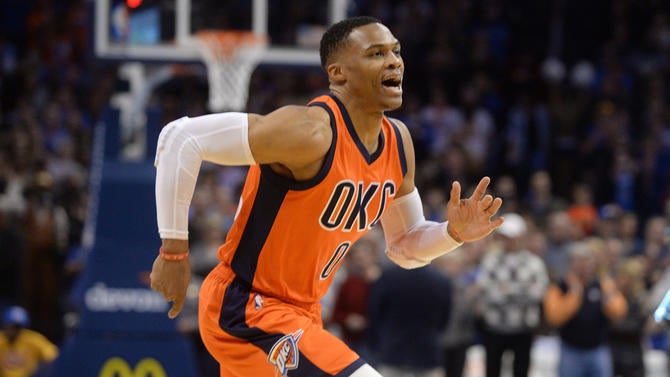
He has the ball all the time; of course he's putting up numbers
Westbrook has the highest usage in the NBA, using up 41 percent of all possessions from his team. That would be the highest in league history, a full 2.3 percentage points higher than Kobe Bryant's 2005-06 season. He always has the ball. He has more than 100 touches per game, and is second in total possession time behind James Harden. Of course he's putting up numbers. He has every opportunity to. If he weren't, there would be something wrong, because he has the longest leash in the league. It's impressive, sure, but let's keep our heads, because the reality is that just because he's free to do what he wants doesn't mean that he's actually contributing in a meaningful way like the other stars in this league.
He still has to do something with the ball
There's obviously no player to really compare Westbrook's usage. So we have to look at an outlier number. Let's say 35 percent usage, which is still an exceptionally high number of possessions. Now, let's look at PER.
Why PER? Player Efficiency Rating, developed by Grizzlies executive John Hollinger when he was with ESPN, gets a bad rap because it's treated as a do-it-all to evaluate player quality, but it doesn't factor defense and rewards shooting and rebounds to a high degree. That said, the metric is specifically designed to evaluate how much a player produces per minute in multiple categories, so it's perfect for this case. Here's the list of guys with 35 percent usage or higher, sorted by PER:
So Westbrook has the fourth-highest PER of any player to use this many possessions, and is averaging more assists and rebounds than any of the three superstars above him. Here's why this stat actually is insightful in this context:
It shows you that just having the ball a lot doesn't mean you produce. Look at how often Hall of Famer Allen Iverson is on this list. Iverson had the ball all the time, constantly searching, and yet Westbrook has nearly four more assists. He has more rebounds than DeMarcus Cousins and Carmelo Anthony on this squad.
Having the ball isn't enough. You have to do something with the ball, and Westbrook is doing more than almost anyone in history. Fans and media tend to act like shots are a gift, but players often say that creating shots is exhausting. It's why they respected Bryant so much; taking on that kind of scoring load is tough work, and Westbrook is doing it while also filling those other categories.
Sure, but he's stat-padding
Westbrook is hunting for rebounds and assists. We've always known that home scoring tables will be as generous as possible with assists, and Westbrook is mostly just stealing rebounds from teammates. After all, he has the lowest contested rebound rate of any player averaging over 10 boards per game. It's great that he's tracking down rebounds no one is fighting for, but that shouldn't actually impress us.
It's more complicated than stat-padding
There's a big reason Westbrook is getting all these uncontested rebounds. It's part of the team's scheme. ESPN's Royce Young has pointed out the Thunder bigs will box out, allowing Westbrook to go in and scoop up the rebound. Sure, that boosts his numbers. But it also means that Westbrook is able to get the ball faster, push it up the court and score.
Nylon Calculus put this hypothesis to the test, and sure enough, the Thunder's time to score shooting efficiency increased when Westbrook rebounded vs. any other Thunder player.
When he takes the rebound, they have a higher effective field goal percentage than when a teammate does. They also attack a tad more quickly. Granted, the sample size is small, and there are many other variables (free throws, turnovers, etc.) that a deeper analysis would consider before sweeping conclusions are drawn. But, intuitively, these preliminary numbers make sense.
A Westbrook defensive rebound eliminates at least one pass and, in cases where possession is guaranteed, perhaps gives the Thunder big men a running start. It puts Oklahoma City in position to generate additional offensive transitions. It has enough potential upside to make the idea worth trying, so you can understand why Billy Donovan might, in Young's words, "push for" it. Here's a case where Westbrook's distinctively aggressive play can be leveraged to advance team concepts.
Source: Nylon Calculus: Westbrook's triple-doubles, stat padding and team strategy.
One thing I've learned when watching the NBA is that there are rebounders who get good numbers for themselves, but don't help the team rebound effectively. If a player gets a high number of rebounds, but the team grabs a lower percentage of available rebounds, it means the opponent does better at crashing the glass when that player is on the court, so what impact is he making?
But with Westbrook on the floor, OKC has a higher rebound percentage (53.8 percent) than when he's on the bench (47.6 percent). No matter who is getting the rebounds, the Thunder are a better rebounding team when Westbrook is on the court.
So, yes, Westbrook is hunting these stats, but he is also doing so in a way that contributes to what the team wants and needs to accomplish. He's making the team better by stat hunting.
By getting all those numbers, his defense suffers
Westbrook is so busy hunting these numbers that he misses out on the other end. We've seen before how lazy he can be on that end. Maybe he would have more energy if he wasn't so busy going full throttle after every triple-double. After all, opponents are shooting 4.0 percentage points better vs. Westbrook this season.
What's the real upside if he is not going to be a two-way player?
Is his defense hurting the Thunder?
That doesn't seem to be the case. The Thunder have a 105.1 defensive rating with Westbrook on the bench. That number drops to 100.5 per 100 possessions when Westbrook is on the court. So the defense is five points better, even when Westbrook isn't locked in, when he's on the court. Plus there are very few instances this season where you've seen Westbrook completely spaced out. He's in the 59th percentile (above average) in individual defense, via Synergy Sports.
Now, those are just figures, but we're not looking at a 2015-16 Harden-like situation here. If anything, it looks like the Thunder are doing a good job of finding ways to hide him effectively on defense. And the Thunder's defense has been great. They're currently seventh in the league.
Being a two-way player is important, but when you're producing like he is everywhere else, it helps mitigate the damage caused. At some level, it's a trump card.
There are still a lot of warts regarding efficiency
Westbrook is shooting 42.7 percent and 33.3 percent from 3-point range. Carmelo Anthony is having a down season as a volume scorer, and even his numbers are better than that. Oh, and the Thunder are only 16th in offensive rating. With the way Westbrook is producing, shouldn't that offensive mark be higher? Oh, and let's not forget the turnovers. He's averaging 5.6.
He is not making them into a juggernaut, he is just absorbing the load and not doing it with even an average level of efficiency for a star player. That has to matter. He's wasting possessions.
We've got to see the bigger picture
The turnovers are bad, and the field-goal percentage is genuinely wretched given how many shots he takes. Some of this is directly tied to that usage, though. There is an inherent slide that occurs with more usage. It's part of being human, or whatever version of human Westbrook is. Meanwhile, if Westbrook were just a gunner putting up that many shots and missing that often, the criticism would have more impact. But he is also creating assists and grabbing all those rebounds, (plus steals and blocks). That production helps offset the efficiency cost of his jumper.
The real question we get to when we try and talk about these pros and cons is whether Westbrook's performance helps or hurts the Thunder. And you can't look at this roster, after Kevin Durant bolted for the team that beat them in the Western Conference finals, and say that Westbrook is holding any other player down.
Keep these four points in mind:
- He's not hurting their defense.
- Their offense goes off a cliff when he's not on-court (92.9 offensive rating when he's on the bench; they basically become the Magic.)
- He's doing more with a bigger offensive load than nearly anyone in history.
- The Thunder are winning.
It may not be a perfect formula, but it's working for OKC, and meanwhile, we're watching a human electrical storm tear through the NBA and reaping the benefits of amazing play night after night. Don't get caught up in the details, stop trying to find ways to tear down his performance. Buy the ticket, take the ride and let Westbrook be Westbrook.
![[object Object] Logo](https://sportshub.cbsistatic.com/i/2020/04/22/e9ceb731-8b3f-4c60-98fe-090ab66a2997/screen-shot-2020-04-22-at-11-04-56-am.png)











